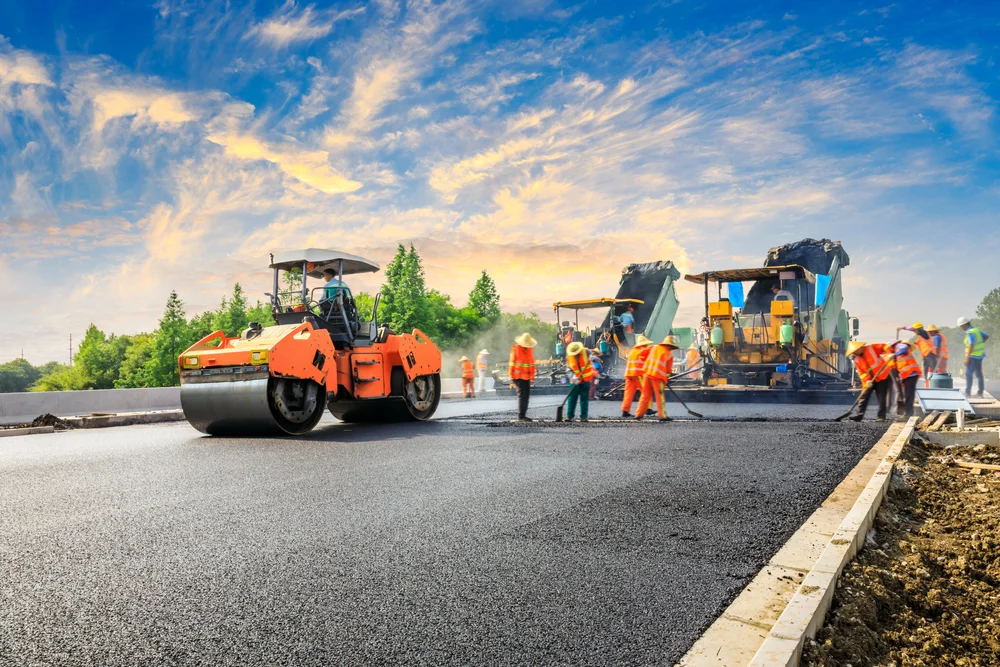Revamp Your Building's Allure: Hot Mix Asphalt Paving for Regrading Projects
Revamp Your Building's Allure: Hot Mix Asphalt Paving for Regrading Projects
Blog Article
Checking Out the Environmental Benefits of Warm Mix Asphalt
The usage of Hot Mix Asphalt in infrastructure jobs offers a compelling situation for sustainable growth and ecological stewardship. By diving into the intricate details of its manufacturing processes and the cutting-edge use of recycled products, a much deeper understanding arises of just how this modern technology surpasses simple surface applications. The ecological benefits of Hot Mix Asphalt prolong much past initial impacts, using a nuanced perspective on exactly how this product can lead the way for a greener future.

Lowered Greenhouse Gas Emissions
Warm Mix Asphalt production uses a considerable reduction in greenhouse gas exhausts compared to various other sidewalk products. The production procedure of Hot Mix Asphalt involves heating the mix of accumulation and asphalt binder to heats. This process calls for less energy compared to the manufacturing of alternate pavement products, causing reduced greenhouse gas exhausts. In addition, using recycled products in Warm Mix Asphalt additionally adds to lowering its ecological effect. By integrating recovered asphalt pavement and recycled asphalt roof shingles right into the mix, the need for virgin products is minimized, causing energy cost savings and lowered exhausts related to extraction and handling.
Researches have actually revealed that Hot Mix Asphalt sidewalks have a smaller sized carbon impact over their life cycle compared to various other sidewalk alternatives. The sturdiness and recyclability of Warm Mix Asphalt even more enhance its ecological advantages by lowering the need for frequent maintenance or replacement, consequently preserving resources and reducing exhausts related to repair activities.
Power Effectiveness and Conservation
The production procedure of Hot Mix Asphalt not just decreases greenhouse gas discharges but additionally adds significantly to energy efficiency and preservation initiatives. Power efficiency is a crucial advantage of Warm Mix Asphalt manufacturing compared to other pavement types. The process entails heating up the products at heats to produce the asphalt mix, which requires less energy than different methods. Furthermore, the capacity to reuse and reuse asphalt pavement even more enhances power preservation. By incorporating recovered asphalt sidewalk (RAP) into brand-new mixes, the sector saves power that would have been needed to create totally brand-new materials. The durability of Hot Mix Asphalt lowers the regularity of upkeep and reconstruction, leading to long-lasting energy savings. This longevity minimizes the energy-intensive processes included in frequent repairs and replacements. In General, Warm Mix Asphalt stands out as an eco-friendly option that prioritizes power effectiveness and preservation throughout its lifecycle.
Sustainable Sidewalk Solutions

One trick element of sustainable pavement options is using recycled materials such as reclaimed asphalt pavement (RAP) and recycled asphalt tiles (RAS) By integrating these materials into the asphalt mixtures, the need for virgin sources is lowered, leading to lower power usage and greenhouse gas discharges during production. In addition, the reuse of these products assists divert waste from garbage dumps, contributing to a more lasting and circular economy.
Furthermore, sustainable sidewalk remedies concentrate on maximizing anonymous sidewalk style to enhance performance and long life. Strategies such as warm mix asphalt (WMA) and stone mastic asphalt (SMA) enhance the durability and strength of sidewalks, decreasing the need for frequent fixings and substitutes. By applying these ingenious techniques, infrastructure programmers can develop pavements that not only meet high-performance criteria however additionally lessen their environmental footprint.
Minimized Environmental Effect
Warm mix asphalt, in particular, uses several benefits that add to minimizing the total environmental impact of road facilities. One vital aspect is the recyclability of asphalt, which can be recycled numerous times without compromising its high quality - Regrading.
Furthermore, discover here the manufacturing of warm mix asphalt produces reduced degrees of greenhouse gases contrasted to other sidewalk products, making it an extra environmentally pleasant alternative. The power efficiency of asphalt plants has likewise boosted over the years, resulting in minimized gas intake and read the full info here lower emissions. Furthermore, the smooth surface area of hot mix asphalt minimizes rolling resistance for lorries, causing reduced fuel usage and reduced air pollution from lorry exhausts.
Contribution to Climate Change Mitigation
Warm mix asphalt plays a critical duty in mitigating climate change via its sustainable properties and reduced environmental impact. One significant payment to environment adjustment reduction comes from the energy efficiency of warm mix asphalt manufacturing. Contrasted to other sidewalk choices, the production process for warm mix asphalt takes in less energy and discharges lower degrees of greenhouse gases, thus lowering its general carbon footprint.
In addition, warm mix asphalt's ability to mirror sunlight, referred to as albedo, aids in decreasing urban warm island results. By lessening heat absorption and retention, warm mix asphalt pavements can lower the need for a/c in metropolitan locations, consequently lowering greenhouse gas exhausts related to power intake for cooling functions.
Additionally, the toughness and recyclability of warm mix asphalt further enhance its environment modification mitigation capabilities. Regrading. The lengthy lifespan of asphalt sidewalks decreases the demand for regular repairs or substitutes, ultimately lowering the carbon emissions connected to road upkeep tasks. The recyclability of asphalt materials minimizes the demand for virgin sources and lowers the environmental influence of sidewalk construction, aligning with lasting techniques for climate modification reduction.
Verdict
Finally, the environmental advantages of Warm Mix Asphalt show its significant contribution to minimizing greenhouse gas emissions, saving power, and decreasing environmental effect. This lasting sidewalk remedy straightens with environment modification mitigation efforts, promotes resource conservation, and boosts infrastructure development. By utilizing recycled products, energy-efficient manufacturing processes, and long lasting style, Hot Mix Asphalt plays an essential duty in fostering an extra eco-friendly technique to facilities construction.
The production process of Warm Mix Asphalt entails heating the blend of aggregate and asphalt binder to high temperature levels. By integrating recovered asphalt sidewalk and recycled asphalt shingles into the mix, the demand for virgin products is minimized, leading to energy savings and reduced emissions linked with removal and processing.
One key facet of sustainable sidewalk solutions is the usage of recycled materials such as redeemed asphalt pavement (RAP) and recycled asphalt tiles (RAS) Methods such as cozy mix asphalt (WMA) and stone mastic asphalt (SMA) enhance the sturdiness and durability of pavements, reducing the demand for frequent repair work and replacements. Contrasted to various other pavement options, the production procedure for warm mix asphalt consumes much less power and sends out reduced degrees of greenhouse gases, thus reducing its overall carbon impact.
Report this page